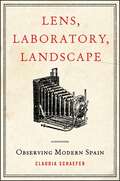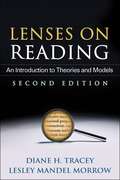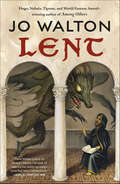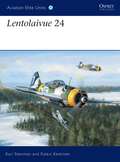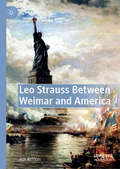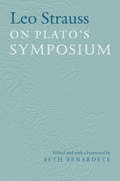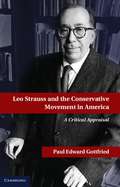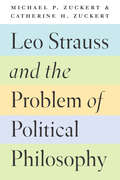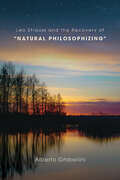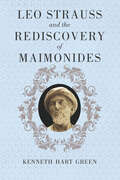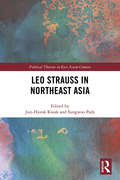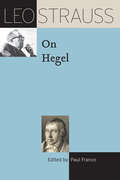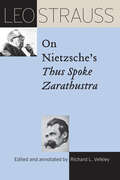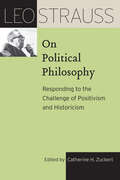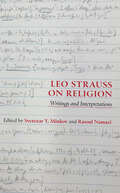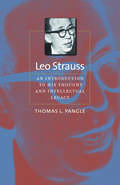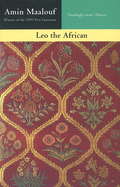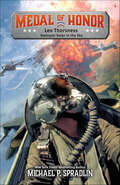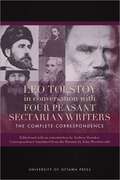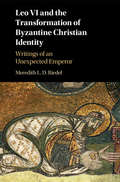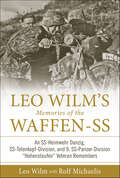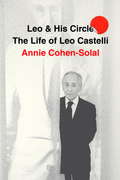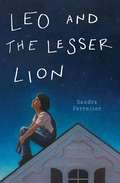- Table View
- List View
Lens, Laboratory, Landscape: Observing Modern Spain (SUNY series in Latin American and Iberian Thought and Culture)
by Claudia SchaeferLens, Laboratory, Landscape focuses on competing views about the power of vision in Spain between the 1830s and the 1950s. The photographic lens, laboratory microscope, "retinal vision" of philosopher José Ortega y Gasset, and the topographical studies of Manuel de Terán are woven together in and around a European cultural milieu that gave observation primacy. For once, Spain—now bereft of its empire—was not on the outside of such debates. Whether in the laboratory, family home, darkroom, art gallery, or on the road, in Cuba or Zaragoza, Madrid or Massachusetts, Spanish artists and scientists were engaged with the social and economic power of observation at a time when the speed of modern life made observing a challenge. Claudia Schaefer brings the technologies of the eye—photograph, microscope, lens, tools for land surveying—to light as markers on the nation's touted path to modernity.
Lenses on Reading, Second Edition
by Diane H. Tracey Lesley Mandel MorrowThis widely adopted text explores key theories and models that frame reading instruction and research. Readers learn why theory matters in designing and implementing high-quality instruction and research; how to critically evaluate the assumptions and beliefs that guide their own work; and what can be gained by looking at reading through multiple theoretical lenses. For each theoretical model, classroom applications are brought to life with engaging vignettes and teacher reflections. Research applications are discussed and illustrated with descriptions of exemplary studies. New to This Edition Current developments in theory, research, and instructional practices. Useful pedagogical features in every chapter framing questions, discussion ideas, and learning activities. Classroom applications give increased attention to English language learners and technology integration. Coverage of additional theories (Third Space Theory) and theorists (Bakhtin and Bourdieu).
Lent: A Novel of Many Returns
by Jo WaltonFrom Hugo, Nebula, and World Fantasy Award-winning Jo Walton comes Lent, a magical re-imagining of the man who remade fifteenth-century Florence—in all its astonishing strangenessYoung Girolamo’s life is a series of miracles.It’s a miracle that he can see demons, plain as day, and that he can cast them out with the force of his will. It’s a miracle that he’s friends with Pico della Mirandola, the Count of Concordia. It’s a miracle that when Girolamo visits the deathbed of Lorenzo “the Magnificent,” the dying Medici is wreathed in celestial light, a surprise to everyone, Lorenzo included. It’s a miracle that when Charles VIII of France invades northern Italy, Girolamo meets him in the field, and convinces him to not only spare Florence but also protect it. It’s a miracle than whenever Girolamo preaches, crowds swoon. It’s a miracle that, despite the Pope’s determination to bring young Girolamo to heel, he’s still on the loose…and, now, running Florence in all but name.That’s only the beginning. Because Girolamo Savanarola is not who—or what—he thinks he is. He will discover the truth about himself at the most startling possible time. And this will be only the beginning of his many lives."Rendered with Walton's usual power and beauty...It's this haunting character complexity that ultimately holds the reader captive to the tale." —N. K. Jemisin, New York Times, on My Real ChildrenAt the Publisher's request, this title is being sold without Digital Rights Management Software (DRM) applied.
Lentolaivue 24
by John Weal Kari StenmanFinland's premier fighter squadron during World War 2, Lentolaivue 24 (Flying Squadron 24) first saw action during the bloody Winter War of 1939-40, when the Soviet Red Army launched a surprise attack on the small Scandinavian country - the squadron enjoyed great success against numerically superior opposition. LLv 24 was once again in the thick of the action following the outbreak of the Continuation War in June 1941. Easily the air force's most successful fighter unit, LLv 24 claimed 877 kills, and its pilots won five direct and two indirect Mannerheim Crosses (Finland¹s highest military award) out of a total of 19 presented to all Finnish soldiers. Most top aces also scored the bulk of their kills flying with this unit.
Leo Strauss
by Robert HowseExamines the German and Jewish sources of Strauss's thought and the extent to which his philosophy can shed light on the crisis of liberal democracy.
Leo Strauss Between Weimar and America
by Adi ArmonThis is the first book-length examination of the impact Leo Strauss’ immigration to the United States had on this thinking. Adi Armon weaves together a close reading of unpublished seminars Strauss taught at the University of Chicago in the 1950s and 1960s with an interpretation of his later works, all of which were of course written against the backdrop of the Cold War. First, the book describes the intellectual environment that shaped the young Strauss’ worldview in the Weimar Republic, tracing those aspects of his thought that changed and others that remained consistent up until his immigration to America. Armon then goes on to explore the centrality of Karl Marx to Strauss’s intellectual biography. By analyzing an unpublished seminar Strauss taught with Joseph Cropsey at the University of Chicago in 1960, Armon shows how Strauss’ fragmentary, partial engagement with Marx in writing obscured the important role that Marxism actually played as an intellectual challenge to his later political thinking. Finally, the book explores the manifestations of Straussian doctrine in postwar America through reading Strauss’ The City and Man (1964) as a representative of his political teaching.
Leo Strauss On Plato's Symposium
by Leo Strauss Seth BenardeteThe first major piece of unpublished work by Leo Strauss to appear in more than thirty years, this volume offers the public the unprecedented experience of encountering this renowned scholar as his students did. Given as a course in autumn 1959 under the title "Plato's Political Philosophy," these provocative lectures-until now, never published, but instead passed down from one generation of students to the next-show Strauss at his subtle and insightful best.
Leo Strauss and the Conservative Movement in America
by Paul E. GottfriedThis book offers an original interpretation of the achievement of Leo Strauss, stressing how his ideas and followers reshaped the American conservative movement. The conservative movement that reached out to Strauss and his legacy was extremely fluid and lacked a self-confident leadership. Conservative activists and journalists felt a desperate need for academic acceptability, which they thought Strauss and his disciples would furnish. They also became deeply concerned with the problem of 'value relativism', which self-described conservatives thought Strauss had effectively addressed. But until recently, neither Strauss nor his disciples have considered themselves to be 'conservatives'. Contrary to another misconception, Straussians have never wished to convert Americans to ancient political ideals and practices, except in a very selective rhetorical fashion. Strauss and his disciples have been avid champions of American modernity, and 'timeless' values as interpreted by Strauss and his followers often look starkly contemporary.
Leo Strauss and the Problem of Political Philosophy
by Catherine H. Zuckert Michael P. ZuckertLeo Strauss and his alleged political influence regarding the Iraq War have in recent years been the subject of significant media attention, including stories in the Wall Street Journal and New York Times.Time magazine even called him “one of the most influential men in American politics.” With The Truth about Leo Strauss, Michael and Catherine Zuckert challenged the many claims and speculations about this notoriously complex thinker. Now, with Leo Strauss and the Problem of Political Philosophy, they turn their attention to a searching and more comprehensive interpretation of Strauss’s thought as a whole, using the many manifestations of the “problem of political philosophy” as their touchstone. For Strauss, political philosophy presented a “problem” to which there have been a variety of solutions proposed over the course of Western history. Strauss’s work, they show, revolved around recovering—and restoring—political philosophy to its original Socratic form. Since positivism and historicism represented two intellectual currents that undermined the possibility of a Socratic political philosophy, the first part of the book is devoted to Strauss’s critique of these two positions. Then, the authors explore Strauss’s interpretation of the history of philosophy and both ancient and modern canonical political philosophers, including Plato, Aristotle, Machiavelli, and Locke. Strauss’s often-unconventional readings of these philosophers, they argue, pointed to solutions to the problem of political philosophy. Finally, the authors examine Strauss’s thought in the context of the twentieth century, when his chief interlocutors were Schmitt, Husserl, Heidegger, and Nietzsche. The most penetrating and capacious treatment of the political philosophy of this complex and often misunderstood thinker, from his early years to his last works, Leo Strauss and the Problem of Political Philosophy reveals Strauss’s writings as an attempt to show that the distinctive characteristics of ancient and modern thought derive from different modes of solving the problem of political philosophy and reveal why he considered the ancient solution both philosophically and politically superior.
Leo Strauss and the Recovery of "Natural Philosophizing" (SUNY series in the Thought and Legacy of Leo Strauss)
by Alberto Marco GhibelliniAmong the political philosophers of the twentieth century, Leo Strauss is usually singled out for his attempt to revitalize the ancient approach to counter the relativism of both historicism and positivism. It is less commonly underscored, however, that the cornerstone of this attempt is the recovery of the question of "nature," which he regarded as inseparable from genuine philosophy since its inception in ancient Greece. Leo Strauss and the Recovery of "Natural Philosophizing" addresses such a theme, focusing on the theoretical presuppositions that Strauss found at the basis of the acquired inability to raise the question of nature. Prominent among these is the encounter between philosophy and revelation, which, due to their conceptual incompatibility, leads to a condition Strauss metaphorically described as a "second, 'unnatural' cave" characterized by insurmountable "prejudices" rather than "appearance and opinion." These, however, are the starting point of genuine philosophy in the Platonic "first, 'natural' cave," which has to be regained, by way of historical deconstruction of the presuppositions of the second cave, if the "natural philosophizing" embodied by Socratic dialectics is to be reactivated.
Leo Strauss and the Rediscovery of Maimonides
by Kenneth Hart GreenIn Leo Strauss and the Rediscovery of Maimonides, Kenneth Hart Green explores the critical role played by Maimonides in shaping Leo Strauss’s thought. In uncovering the esoteric tradition employed in Maimonides’s Guide of the Perplexed, Strauss made the radical realization that other ancient and medieval philosophers might be concealing their true thoughts through literary artifice. Maimonides and al-Farabi, he saw, allowed their message to be altered by dogmatic considerations only to the extent required by moral and political imperatives and were in fact avid advocates for enlightenment. Strauss also revealed Maimonides’s potential relevance to contemporary concerns, especially his paradoxical conviction that one must confront the conflict between reason and revelation rather than resolve it. An invaluable companion to Green’s comprehensive collection of Strauss’s writings on Maimonides, this volume shows how Strauss confronted the commonly accepted approaches to the medieval philosopher, resulting in both a new understanding of Maimonides and a new depth and direction for his own thought. It will be welcomed by anyone engaged with the work of either philosopher.
Leo Strauss in Northeast Asia (Political Theories in East Asian Context)
by Sungwoo Park Jun-Hyeok KwakThis book analyzes the reception of Leo Strauss and his political philosophy in Northeast Asia. By juxtaposing the central idea of Strauss’s political philosophy with the question of modernity, the contributors explore the eclectic adaptations of Strauss in Northeast Asian countries as a philosophical appropriation across cultures. Examining how Strauss’s philosophy was first introduced in Northeast Asia, the book sheds light on the similarities and differences in experiences, challenging the dominant approach which attributes various receptions of Strauss in Northeast Asia solely to sociopolitical circumstances. This book also seeks to move beyond a China-centric approach to investigate the possible transcultural appeals of Strauss’s political philosophy by exploring the cases of Japan and South Korea. Appealing to a wide network of scholars and practitioners in East Asia engaged in rethinking cultural particularities, this volume will be attractive to upper-level undergraduate students, graduate students, and advanced researchers in political philosophy, political theory, and Asian politics.
Leo Strauss on Hegel (The Leo Strauss Transcript Series)
by Leo StraussIn the winter of 1965, Leo Strauss taught a seminar on Hegel at the University of Chicago. While Strauss neither considered himself a Hegelian nor wrote about Hegel at any length, his writings contain intriguing references to the philosopher, particularly in connection with his studies of Hobbes, in his debate in On Tyranny with Alexandre Koje`ve; and in his account of the “three waves” of modern political philosophy. Leo Strauss on Hegel reconstructs Strauss’s seminar on Hegel, supplemented by passages from an earlier version of the seminar from which only fragments of a transcript remain. Strauss focused his seminar on the lectures collected in The Philosophy of History, which he considered more accessible than Hegel’s written works. In his own lectures on Hegel, Strauss continues his project of demonstrating how modern philosophers related to ancient thought and explores the development and weaknesses of modern political theory. Strauss is especially concerned with the relationship in Hegel between empirical history and his philosophy of history, and he argues for the primacy of religion in Hegel’s understanding of history and society. In addition to a relatively complete transcript, Leo Strauss on Hegel also includes annotations, which bring context and clarity to the text.
Leo Strauss on Nietzsche's Thus Spoke Zarathustra (The Leo Strauss Transcript Series)
by Leo Strauss Richard L. VelkleyAlthough Leo Strauss published little on Nietzsche, his lectures and correspondence demonstrate a deep critical engagement with Nietzsche’s thought. One of the richest contributions is a seminar on Nietzsche’s Thus Spoke Zarathustra, taught in 1959 during Strauss’s tenure at the University of Chicago. In the lectures, Strauss draws important parallels between Nietzsche’s most important project and his own ongoing efforts to restore classical political philosophy. With Leo Strauss on Nietzsche’s “Thus Spoke Zarathustra,” eminent Strauss scholar Richard L. Velkley presents Strauss’s lectures on Zarathustra with superb annotations that bring context and clarity to the critical role played by Nietzsche in shaping Strauss’s thought. In addition to the broad relationship between Nietzsche and political philosophy, Strauss adeptly guides readers through Heidegger’s confrontations with Nietzsche, laying out Heidegger’s critique of Nietzsche’s “will to power” while also showing how Heidegger can be read as a foil for his own reading of Nietzsche. The lectures also shed light on the relationship between Heidegger and Strauss, as both philosophers saw Nietzsche as a central figure for understanding the crisis of philosophy and Western civilization. Strauss’s reading of Nietzsche is one of the important—yet little appreciated—philosophical inquiries of the past century, both an original interpretation of Nietzsche’s thought and a deep engagement with the core problems that modernity posed for political philosophy. It will be welcomed by anyone interested in the work of either philosopher.
Leo Strauss on Political Philosophy: Responding to the Challenge of Positivism and Historicism (The Leo Strauss Transcript Series)
by Catherine H. Zuckert Leo StraussLeo Strauss is known primarily for reviving classical political philosophy through careful analyses of works by ancient thinkers. As with his published writings, Strauss’s seminars devoted to specific philosophers were notoriously dense, accessible only to graduate students and scholars with a good command of the subject. In 1965, however, Strauss offered an introductory course on political philosophy at the University of Chicago. Using a conversational style, he sought to make political philosophy, as well as his own ideas and methods, understandable to those with little background on the subject. Leo Strauss on Political Philosophy brings together the lectures that comprise Strauss’s “Introduction to Political Philosophy.” Strauss begins by emphasizing the importance of political philosophy in determining the common good of society and critically examining the two most powerful contemporary challenges to the possibility of using political theory to learn about and develop the best political order: positivism and historicism. In seeking the common good, classical political philosophers like Plato and Aristotle did not distinguish between political philosophy and political science. Today, however, political philosophy must contend with the contemporary belief that it is impossible to know what the good society really is. Strauss emphasizes the need to study the history of political philosophy to see whether the changes in the understanding of nature and conceptions of justice that gradually led people to believe that it is not possible to determine what the best political society is are either necessary or valid. In doing so, he ranges across the entire history of political philosophy, providing a valuable, thematically coherent foundation, including explications of many canonical thinkers, such as Auguste Comte and Immanuel Kant, about whom Strauss did not write extensively in his published writings.
Leo Strauss on Religion: Writings and Interpretations (SUNY series in the Thought and Legacy of Leo Strauss)
by Svetozar Y. Minkov Rasoul NamaziIntriguing unpublished manuscripts by Leo Strauss, which explore the intricate relationship between religion, philosophy, and politics, accompanied by fourteen interpretative essays.Addressing the central theme of his work-the complex relationship between religion, philosophy, and politics-the twelve newly available transcripts included in Leo Strauss on Religion offer unprecedented insights into Leo Strauss's thoughts on previously unexplored subjects. Essential for both avid readers and newcomers, this collection unveils sharper formulations and frank discussions, providing a rare peek into the ambiguous aspects of Strauss's renowned reticence in formulating his ultimate thoughts. Accompanied by fourteen interpretative essays from distinguished scholars, this volume serves as a comprehensive guide to Strauss's intellectual odyssey. Offering fresh perspectives, these essays navigate the understudied aspects of Strauss's reflections on religion, putting his thought in a new perspective thereby enriching the scholarly debate around the controversial yet influential legacy of Leo Strauss.
Leo Strauss: An Introduction to His Thought and Intellectual Legacy (The Johns Hopkins Series in Constitutional Thought)
by Thomas L. PangleLeo Strauss's controversial writings have long exercised a profound subterranean cultural influence. Now their impact is emerging into broad daylight, where they have been met with a flurry of poorly informed, often wildly speculative, and sometimes rather paranoid pronouncements.This book, written as a corrective, is the first accurate, non-polemical, comprehensive guide to Strauss's mature political philosophy and its intellectual influence. Thomas L. Pangle opens a pathway into Strauss's major works with one question: How does Strauss's philosophic thinking contribute to our democracy's civic renewal and to our culture's deepening, critical self-understanding?This book includes a synoptic critical survey of writings from scholars who have extended Strauss's influence into the more practical, sub-philosophic fields of social and political science and commentary. Pangle shows how these analysts have in effect imported Straussian impulses into a "new" kind of political and social science.
Leo The African
by Amin MaaloufFrom his chlidhood in Fez, having fled the Christian Inquisition, through his many journeys to the East as an itinerant merhcant, Hasans story is a quixotic catalogue of pirates, slave girls and princesses, encompassing the complexities of a world in a state of religious flux. Hasan too is touched by the instability of the era, performing his hadj to Mecca, then converting to Christianity, only to relapse back to the Muslim faith later in life. In re-creating his extraordinary experiences, Amin Maalouf sketches an irrisistible portrait of the Mediterranea world as it was nearly five centuries ago - the fall of Granada, the Ottoman conquest of Egypt, Renaissance Rome under the Medicis: all contribute to a background of spectacular colour, matched only by the picaresque adventures of Hasan's life.
Leo The African
by Amin MaaloufFrom his chlidhood in Fez, having fled the Christian Inquisition, through his many journeys to the East as an itinerant merhcant, Hasans story is a quixotic catalogue of pirates, slave girls and princesses, encompassing the complexities of a world in a state of religious flux. Hasan too is touched by the instability of the era, performing his hadj to Mecca, then converting to Christianity, only to relapse back to the Muslim faith later in life. In re-creating his extraordinary experiences, Amin Maalouf sketches an irrisistible portrait of the Mediterranea world as it was nearly five centuries ago - the fall of Granada, the Ottoman conquest of Egypt, Renaissance Rome under the Medicis: all contribute to a background of spectacular colour, matched only by the picaresque adventures of Hasan's life.
Leo Thorsness: Vietnam: Valor in the Sky (Medal of Honor #3)
by Michael P. SpradlinFor middle-grade readers, the true story of a pilot in the U.S. Air Force who received the Medal of Honor for his great acts of aerial valor. Lieutenant Colonel Leo K. Thorsness was a Wild Weasel pilot in the Vietnam War, targeting enemy missile sites. On a 1967 mission, when his wingmen ejected from their burning aircraft, Thorsness initiated attacks on enemy planes and other daring maneuvers in order to protect them. Two weeks later, he was shot down and would become a P. O. W. for the next six years.This is the third nonfiction middle-grade book in the Medal of Honor series, which profiles the courage and accomplishments of recipients of the Medal of Honor, the highest and most prestigious personal military decoration, awarded to recognize U.S. military service members who have distinguished themselves through extraordinary acts of valor.
Leo Tolstoy in Conversation with Four Peasant Sectarian Writers: The Complete Correspondence
by Andrew DonskovAndrew Donskov takes a critical look not only at Tolstoy’s attitude towards the peasant class he so often championed for their simple ways and freedom from upper-class sophistication and pretentiousness, but more importantly, gives voice to representatives of the peasant class itself. The theme of the peasantry is central throughout most of Tolstoy’s long career. His obsession with this class is seen not just as a matter of social or humanitarian concern, but as a response to the questions of “how to live a good life” and “what is the meaning of life that an inevitable death will not destroy?” These questions plagued him his entire life. The letters he exchanged with the four major peasant sectarian writers (Bondarev, Zheltov, Verigin, and Novikov) reveal that Tolstoy was matched as a profound thinker by his correspondents, as they converse on religious-moral questions, the meaning of life and how one should strive to find it, and on a wide array of burning social and personal problems. Reading through the analysis and the extensively annotated letters as a unified whole, elucidates the progressive development of the ideas they shared (and where these diverged) and which guided Tolstoy’s and his correspondents’ lives. Juxtaposing Tolstoy’s letters with those of his four sectarian correspondents makes them even more significant as it shows them in their original context – a dialogue, or conversation. Also, with the aim to present the conversation in an even broader context, Andrew Donskov briefly discusses Tolstoy’s relationship with peasants in general as well as with each of the four individual writers in particular. In addition, he provides a background sketch of two major religious groups, namely the Doukhobors and the Molokans, both of which still claim sizeable populations of followers in North America today. Originally published in 2008 by the Slavic Research Group at the University of Ottawa under the title Leo Tolstoy and Russian peasant sectarian writers: Selected correspondence, the expanded University of Ottawa Press edition includes 44 letters never published in English, out of the total 155 letters. Correspondence translated by John Woodsworth. Published in English.
Leo VI and the Transformation of Byzantine Christian Identity: Writings of an Unexpected Emperor
by Meredith L. RiedelThe Byzantine emperor Leo VI (886–912), was not a general or even a soldier, like his predecessors, but a scholar, and it was the religious education he gained under the tutelage of the patriarch Photios that was to distinguish him as an unusual ruler. This book analyses Leo's literary output, focusing on his deployment of ideological principles and religious obligations to distinguish the characteristics of the Christian oikoumene from the Islamic caliphate, primarily in his military manual known as the Taktika. It also examines in depth his 113 legislative Novels, with particular attention to their theological prolegomena, showing how the emperor's religious sensibilities find expression in his reshaping of the legal code to bring it into closer accord with Byzantine canon law. Meredith L. D. Riedel argues that the impact of his religious faith transformed Byzantine cultural identity and influenced his successors, establishing the Macedonian dynasty as a 'golden age' in Byzantium.
Leo Wilm's Memories of the Waffen-SS: An SS-Heimwehr Danzig, SS-Totenkopf-Division, and 9. SS-Panzer-Division “Hohenstaufen” Veteran Remembers
by Rolf Michaelis Leo WilmA firsthand account of Leo Wilm&’s six years at war in the Waffen-SS
Leo and His Circle: The Life of Leo Castelli
by Annie Cohen-SolalLeo Castelli reigned for decades as America's most influential art dealer. "Leo and His Circle" tells the story of his astonishing life and career.
Leo and the Lesser Lion
by Sandra ForresterA heartwarming family story set during the Depression that reads like a classic. Everyone's been down on their luck since the Depression hit. But as long as Mary Bayliss Pettigrew has her beloved older brother, Leo, to pull pranks with, even the hardest times can be fun. Then one day, there’s a terrible accident, and when Bayliss wakes up afterward, she must face the heartbreaking prospect of life without Leo. And that’s when her parents break the news: they’re going to be fostering two homeless little girls, and Bayliss can’t bear the thought of anyone taking Leo’s place. But opening her heart to these weary travelers might just be the key to rebuilding her grieving family. From the Hardcover edition.
